Founded in 2013, the Centre for Equality and Liberty for the LGBT Community in Kosova (CEL) brings together community members to advocate for their rights and shift public attitudes about LGBT issues.
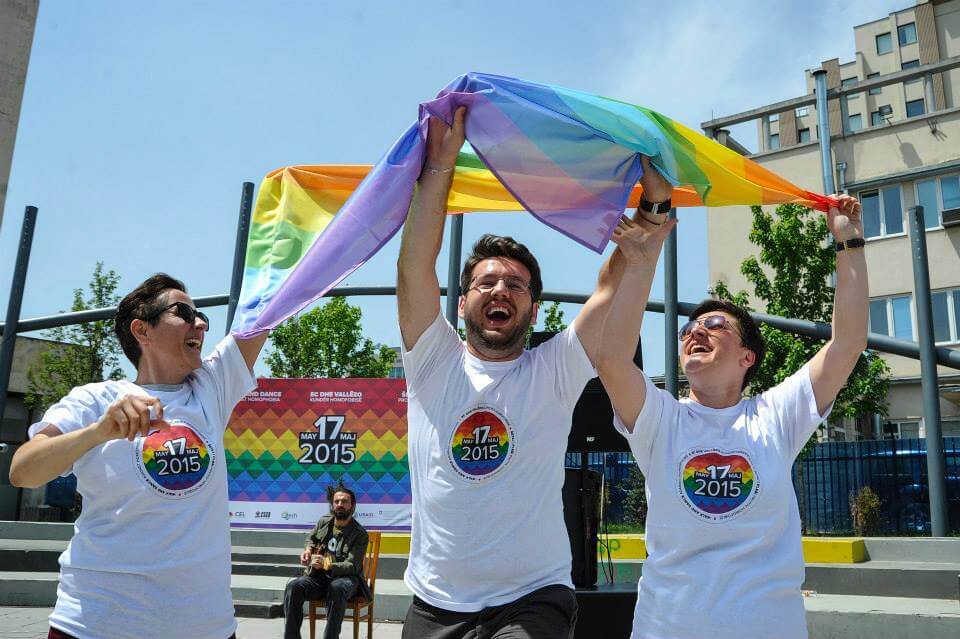
Founded in 2013, the Centre for Equality and Liberty for the LGBT Community in Kosova (CEL) brings together community members to advocate for their rights and shift public attitudes about LGBT issues. Their theatre production “Bent” was the first LGBT-themed play to be performed in the country. The play, performed to packed audiences, helped to revitalize dialogue on human rights and the LGBT community. CEL is now conducting outreach to LGBT community members; creating community spaces for LGBT people, particularly engaging lesbians and bisexual women; and building regional networks by undertaking study visits to LGBT organizations in other countries in the Western Balkans. CEL also focuses its’ work on raising awareness among the general population, in regard to LGBT rights and aims to educate youth and break down barriers caused in their society by misinformation, and conservative attitudes.
Chouf is a feminist organization working about women bodily and sexual rights in Tunisia.
Chouf is a feminist organization working about women bodily and sexual rights in Tunisia. The organization is based on an egalitarian principle that rejects any hierarchical ordering of its members. Chouf defines itself as a group of activists who rely on audiovisual material in their work. In fact, they strongly believe that these audiovisual tools are the most pertinent and effective means to effect immediate change in our social environment and rid us of the stereotypes and prejudiced views we face on a daily basis. They have a multiplicity of objectives, but they all revolve around one necessity: allowing tunisian women, and more specifically FSF women, a safe environment in which they can express themselves freely and work on developing their potentials; an opportunity that otherwise would have been very difficult to obtain given the double discrimination that these women have to face. Indeed, they are oppressed not only for their womanhood, but also for their sexual orientation that is regarded as a deviation from established social norms. In the transitional context they are living after the revolution, feminism has never been of such importance as it is now for the young generations. The rising threat of a radical politicization of Islam that they have witnessed during the past months, together with the patriarchal nature of our educational and societal models, has made it necessary for them to defend their rightful place as women in Tunisia.
For women of the organization Chouf, feminism has always been the source of their inspiration and growth, guiding our involvement in politics and integration in the social and cultural affairs of our country. Their life choices, their professional careers, and their struggles have always been shaped by their deep awareness of being women. That is why they do not associate their feminist vision with any political system. On the contrary, they define it as an acquired awareness and a shattering of the guilt often suffered by women in their search of intellectual and physical freedom; including having a sexuality that does not correspond to what is expected of them in a society governed by men for their own benefit.
Rosa Rabiosa is an LGBTIQ collective in Lima with the mission of promoting social justice, liberation and equal access to resources for the LGBTQI community.
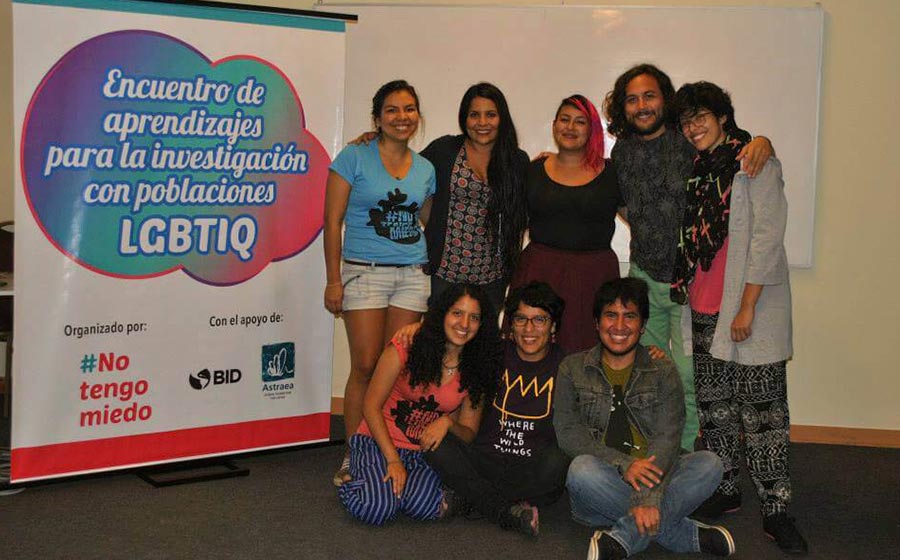
Rosa Rabiosa is an LGBTIQ collective in Lima with the mission of promoting social justice, liberation and equal access to resources for the LGBTQI community. It is composed of a multidisciplinary team composed of artists, youth, activists and academic researchers. In the last three years Rosa Rabiosa through research (two publications), theater (three LGBTIQ testimonial works) and political advocacy has expanded its movement and bases, deeply rooted in the participatory and horizontal organization. Shaping the team, the lines of work, the base of young activists and using innovative tactics has led to the mobilization of impressive support throughout the country for its LGBTQI public policy goals, education and cultural change.
*** En Español***
Rosa Rabiosa es un colectivo LGBTIQ en Lima con la misión de promover la justicia social, la liberación y el acceso igualitario a recursos para la comunidad LGBTQI. Está integrado por un equipo multidisciplinario compuesto por artistas, jóvenes, activistas e investigadorxs académicxs. En los últimos tres años el Rosa Rabiosa a través de la investigación (dos publicaciones), el teatro (tres obras testimoniales LGBTIQ) y la incidencia política ha expandido su movimiento y bases, arraigadas profundamente en la organización participativa y horizontal. La conformación del equipo, la líneas de trabajo, la base de activistas jóvenes y usar tácticas innovadoras ha generado la movilización de un impresionante apoyo a lo largo del país por sus metas de políticas públicas LGBTQI, educación y cambio cultural.
Diverse Voices and Action for Equality started in 2011 to formalize a growing grassroots LBTI peer support group in Suva, Fiji.
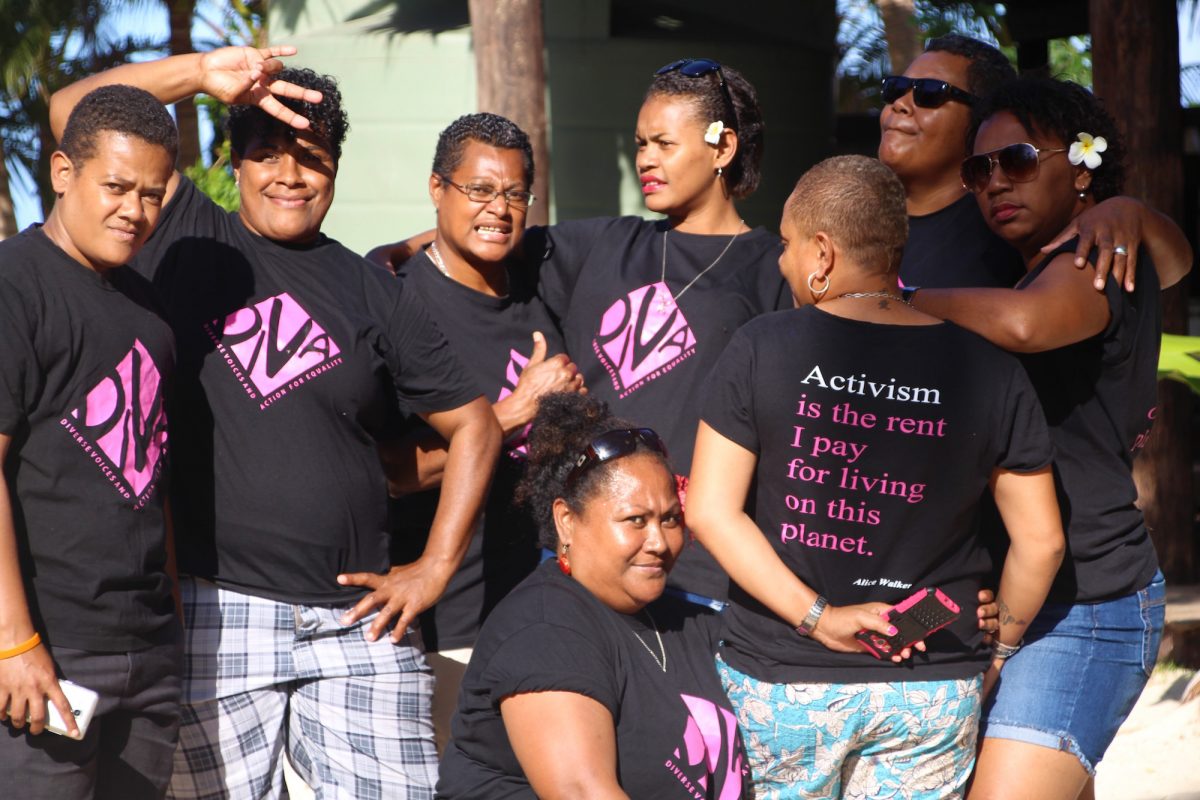
Diverse Voices and Action for Equality started in 2011 to formalize a growing grassroots LBTI peer support group in Suva, Fiji. DIVA has since grown to become a feminist Fiji national collective and network of high need and marginalised lesbians, bisexual women, trans masculine and gender nonconforming and intersex women and people working from local to global, on issues of human rights and social justice, including gender and sexual, social, economic and ecological justice. We prioritise work in Fiji and Pacific small island states. DIVA for Equality works from a strong south feminist intersectional and interlinkage analysis – identifying and advocating on lived realities of LBTI women and people, both as a collective and community, and through joint work with other feminists, wider women-led groups and community groups, civil society groups and social movements, and Pacific governments as able – toward recognition, protection and advancement of sexual rights, human rights, gender justice and social, economic, ecological and climate justice. DIVA for Equality provides practical urgent action and support to lesbian, bisexual women and transgender masculine and gender nonconforming women and people. We strengthen, create and facilitate safe spaces to organise, articulate constituency positions, build stronger community led hubs and networks, and increase levels of constructive collaboration in wider civil society and social movements. We struggle for realisation of universal human rights, access to justice and liberation, and resist all marginalisation, discrimination and violence.
El encuentro feminista “Lesbitransinter” de Latinoamérica y el Caribe se llevó a cabo en San José, Costa Rica del 22 al 24 de julio, 2015.
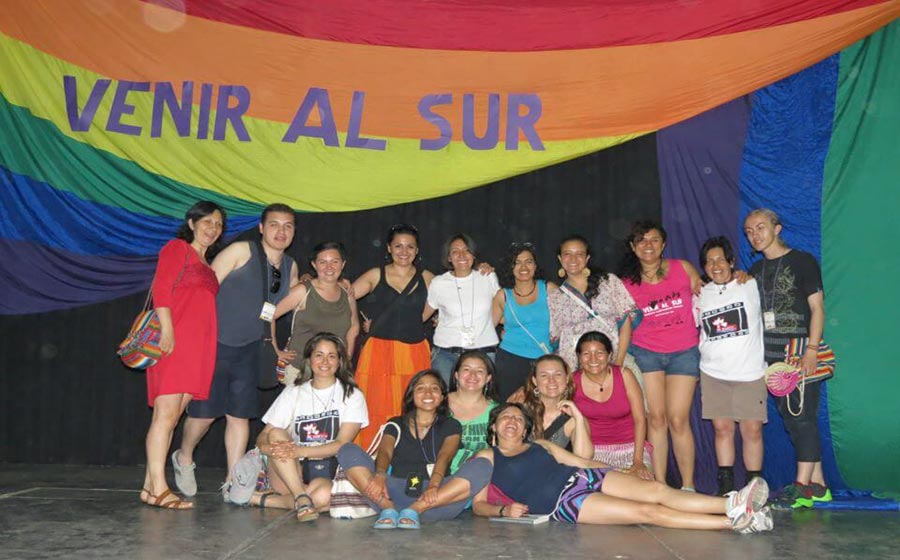
El encuentro feminista “Lesbitransinter” de Latinoamérica y el Caribe se llevó a cabo en San José, Costa Rica del 22 al 24 de julio, 2015. Las metas de la serie de encuentros continuos son crear un espacio abierto para promover el diálogo, la reflexión y el debate entre diversas partes del movimiento; reflexionar sobre los avances y los fallos del movimiento feminista; y promover colaboraciones políticas regionales que influyan al movimiento en años venideros. El arte como herramienta de transformación social fue un eje central de este más reciente encuentro, junto con el placer y el disfrute–como derechos básicos y como estrategias.
***
El encuentro feminista “Lesbitransinter” de Latinoamérica y el Caribe se llevó a cabo en San José, Costa Rica del 22 al 24 de julio, 2015. Las metas de la serie de encuentros continuos son crear un espacio abierto para promover el diálogo, la reflexión y el debate entre diversas partes del movimiento; reflexionar sobre los avances y los fallos del movimiento feminista; y promover colaboraciones políticas regionales que influyan al movimiento en años venideros. El arte como herramienta de transformación social fue un eje central de este más reciente encuentro, junto con el placer y el disfrute–como derechos básicos y como estrategias.
Justice for Sisters was formed in 2010 in response to violent and arbitrary arrests that had taken place in Seremban, Negeri Sembilan against trans women.

Justice for Sisters was formed in 2010 in response to violent and arbitrary arrests that had taken place in Seremban, Negeri Sembilan against trans women. The group successfully built a case for a constitutional review of Section 66, the state syariah law, that penalizes trans women on the grounds of their gender identity and expression and empowers state religious departments to target trans women with impunity. In 2013, they launched “I AM YOU: be a trans ally”, a public awareness campaign in multiple local languages to support their public education and advocacy efforts. The case was struck down by the Supreme Court in 2015, however, in a shifting political environment that reflects a broader loss of judicial independence in the country overall. Justice for Sisters is continuing to fight in the longer term to create a positive environment for all trans people living in Malaysia. They are working to raise awareness about the impact of criminalization of trans people in Malaysia, increase positive representation of the community in various venues, and build leadership and a national network of transgender activists.
Founded in 2013, it is the first openly lesbian group in the southern Andean region of Peru, where there are high levels of institutional violence and hate for LGBT people, and where extreme religious fundamentalism halts all power to make decisions.
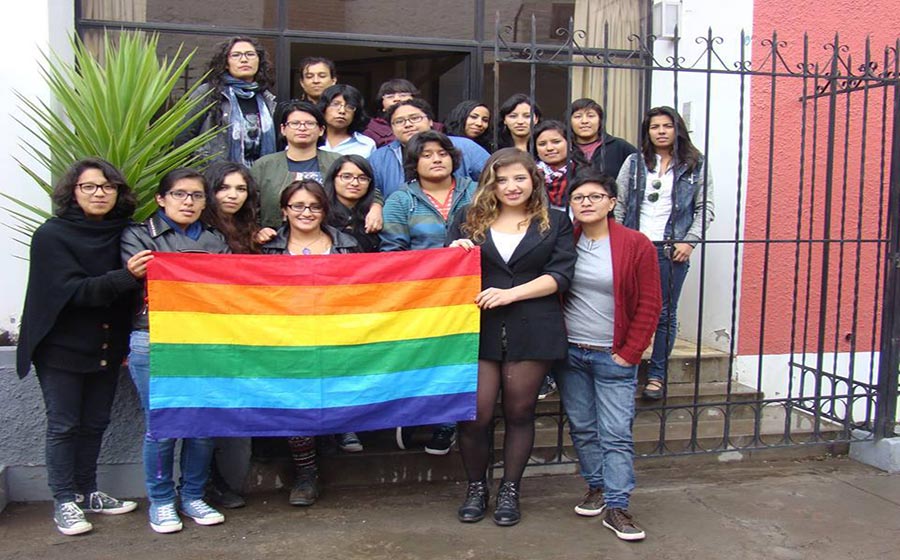
Movimiento Lesbia is a young lesbian organization based in the city of Arequipa, Peru. Founded in 2013, it is the first openly lesbian group in the southern Andean region of Peru, where there are high levels of institutional violence and hate for LGBT people, and where extreme religious fundamentalism halts all power to make decisions. Many of the members are under 30 years old and come from areas of the city that are very marginalized. Its mission is to end discrimination and violence against LGBT communities, in particular violence against lesbian and bisexual women. *** Movimiento Lesbia es una joven organización lésbica con base en la ciudad de Arequipa, Perú. Fundado en 2013, es el primer grupo abiertamente lésbico en la región sureña andina de Perú, donde hay altos niveles de violencia institucional y de odio hacia las personas LGBT, y donde un fundamentalismo religioso extremo acapara todo el poder para tomar decisiones. Muchas de las personas miembro tienen menos de 30 años y provienen de áreas de la ciudad súmamente marginalizadas. Su misión es acabar con la discriminación y la violencia hacia las comunidades LGBT, en particular la violencia contra las mujeres lesbianas y bisexuales.
Founded in 2011 in Budapest, Hungary, Radical Queer Affinity Collective (RQAC) is a transnational queer and trans feminist collective committed to building a network of activists in Hungary.
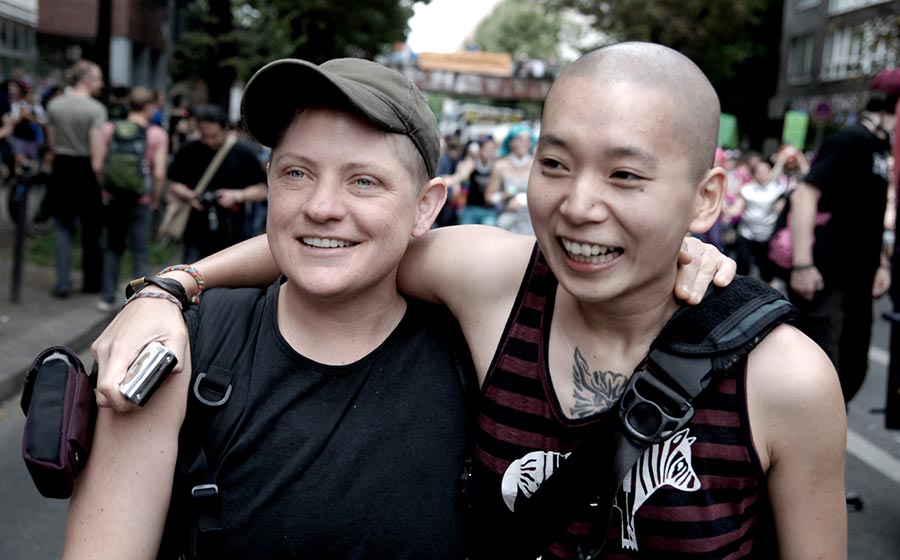
Founded in 2011 in Budapest, Hungary, Radical Queer Affinity Collective (RQAC) is a transnational queer and trans feminist collective committed to building a network of young queer and trans activists in Hungary and the Central and Eastern European region. They center the experiences and voices of queer and trans youth, sex workers and migrants. Through direct action, cultural activism and capacity-building, they tackle and challenge homonormativity and transphobia. An early achievement was their creation of a community space called “KLIT” in Budapest. The first of its kind, the space provided a safe platform for queer and trans youth to convene and organize discussion groups, workshops, trainings, and cultural and political events, changing the landscape for queer youth activism in Central and Eastern Europe. When in late 2014 they had to close their community space due to lack of resources, gentrification and harassment, RQAC transitioned into using alternative platforms of communication and engagement to continue their movement-building efforts. RQAC is grounded in nurturing collective and self-care as key strategies to building autonomous and safe communities.
Togetherness for Equality and Action (TEA) is a lesbian, queer and bisexual women led group founded in 2013 and committed to building a sustainable and inclusive LBT movement in Thailand.
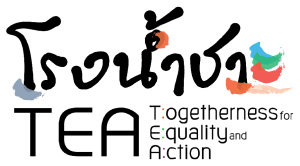
Togetherness for Equality and Action (TEA) is a lesbian, queer and bisexual women led group founded in 2013 and committed to building a sustainable and inclusive LBT movement in Thailand. They aim to cultivate and empower LBT youth activists from traditionally marginalized communities (low-income, rural, disabled, and from ethnic groups and religious minorities) through capacity-building trainings and curriculum development. Their core activities include a story documentation project to raise public awareness around LBTI rights in marginalized communities, and facilitating activist building programs to provide resources and opportunities for LGTI youth. Through their story project they continue to collect stories and experiences of LBT communities to gather data that can disseminated via research articles and other media outlets, such as online blogs, and infographics. Through their activist building trainings, they are engaging youth from a wide range of backgrounds and experiences, from little or zero experience, to seasoned activists.
Femme en Action Contre la Stigmatisation el la Discrimination Sexuelle (FACSDIS) was founded in July 2010 as a response to the discrimination and violence LBT women and sex workers faced in Haiti in the context of the earthquake.
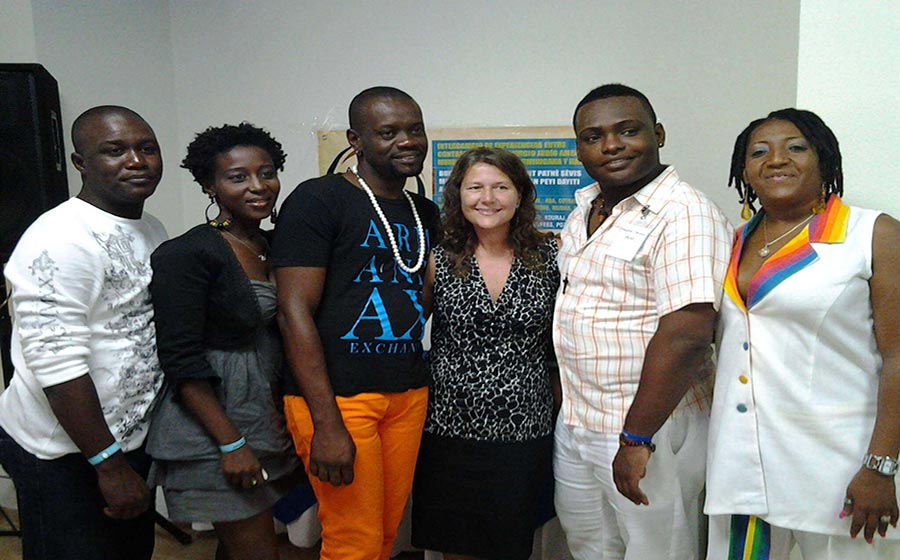
Femme en Action Contre la Stigmatisation el la Discrimination Sexuelle (FACSDIS) was founded in July 2010 as a response to the discrimination and violence LBT women and sex workers faced in Haiti in the context of the earthquake. FACSDIS’s mission is to end stigma and gender discrimination and to support the struggle of oppressed and marginalized women such as LBT women, sex workers and people living with HIV. Outside of the capital, Port Au Prince, they work with LBT women to raise awareness, build their capacity to advocate for their rights, and promote access to jobs, health care and education. They organize and respond to the rape commonly targeting butch and masculine-presenting women in the community. They work to address the stigma around rape, and they do workshops with police and judges so that their response to these cases is not lesbophobic and discriminatory, furthering the trauma and violence survivors experience. They also work with incarcerated women, LBT women and sex workers who are criminalized for who they are and have no due process; they have helped to free several LBT women who were wrongfully incarcerated.










